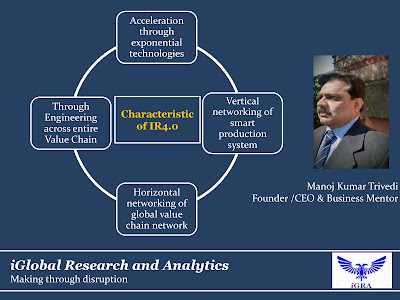Organisational biggest dilemma
Organizational biggest dilemma
By,
Manoj Kumar Trivedi
Founder Director & Business Mentor
iGlobal Research and Analytics
PwC in its 21st CEO Survey report has observed Business executives are contending more
and more with the results of societal
upheaval – geopolitical uncertainty,
populism, terrorism – rather than economic
or corporate risks such as access to affordable
capital, new market entrants, or their own
readiness to respond to a crisis. Whether it
is tax reform in the US, the Brexit talks, the
spectre of Catalonian secession in Spain,
or China’s emerging vision for the next few
years, we continue to see geopolitics play
a critical role in how leaders craft their
business strategy.
Misalignment between global economic growth and social progress is fast growing with no concern. Although majority of CEO's globally are of uniform opinion that Skill Gap will be the main challenge in the years ahead, they are ignorant of right skill and changes/disruptions ahead. They need to expect the unexpected and accept it.
Great leadership lies in aligning macroeconomy implications at micro level while finding ways to build sustainability megaforces. CEO's are seemingly confident of economic growth and are highly optimist. Similar confidence nosedived in 2009 due to global financial crisis.
Alongside confidence and optimisn, corner office is highly anxious keeping them up at night. Threats to their organisational growth prospect is alarming. The threat lies more within than outside.
Findings of PwC has observed one good news that almost all the CEO's has owned the responsibility of re-skilling in new environement.
Alongside confidence and optimisn, corner office is highly anxious keeping them up at night. Threats to their organisational growth prospect is alarming. The threat lies more within than outside.
Findings of PwC has observed one good news that almost all the CEO's has owned the responsibility of re-skilling in new environement.
End of Management era
"The key to management is to get rid of the managers," advised Ricardo Semler, whose TED Talk went viral, introducing terms such as “industrial democracy” and “corporate re-engineering”.
As CEO of successful industry, probably he is right. Making Managers enablers by Morning Star or Southwest Airlines [LUV] or Valve or Zappos changing their traditional role has not only changed the culture, but yielded results leading to growth.
Practicing objective Management principles shunning ideas and opinions of team members has seen its days in disruptive age. Experts now seek participation of entire team through creativity and innovation.
Industrial democracy helps building "Cross-functional Skill" allowing talents to analyze and understand resource behavior that takes them to third stage of cognitive development when they start realizing - different discipline makes very different assumptions leading to a different conclusions about what is "right"- a stage of creativity through economic reasoning.
The reason why industry underperform is the inability of leaders to execute tasks against the issues arising today or on real time basis in a way that prepares organisations for the future. Here lies the big gap.
Ever shifting market is not peremptory.Understanding economy's stress point and operational economic fine print determining market determinant will ensure growth. Disruptions and growing business complexity are the biggest organisational dilemma. Growth is directly proportionate to shrinking leadership ability. Instituting Industrial democracy for subjectivity will allow self-develop critical thinking, analytical power, judgemental and decision making power at execution level.Organisations could no more afford supportive functions. They have to look beyond tools for doing things right like Lean Process, TPM & Kanban. They have to allow doing right things keeping "Management' redundant, conceptualising
Business = Economic Engineering
a very important characteristic of Industry 4.0. Technology may accelerate production and integrate vertically and horizontally smart production system. It may reduce cost through Labor Cost,Predictive Maintenance and Energy Management but it has no mind or consciousness to study resource behavior or plan future course of action. Cost reduction through technology may have its limitations while neutralizing macroeconomic implications at microlevel of operation cost reduction through Economic Engineering will have no limit through productivity analysis and efficiency.
Leading CEOs are already actively exploring alternative metrics for measuring the longterm health of their companies and the communities they serve, beyond just earnings or stock price, and boards are facilitating that shift by asking more qualitative questions: What about talent re-skilling and knowledge upgradation? Various alternative matrix for measuring the long term health of their companies and improve underperformance have failed. Modern theories of firm strategy have also failed to integrate with standard models and analytical tools to improve performance. Companies are adopting different elements of the revolution in diverse ways, some gingerly, some in a sure-footed manner. Many have launched pilot projects, while many others have totally migrated some of their business functions to AI-led processes. And many companies are still waiting and watching.
Their biggest dilemma is well appreciative. Talents must be re-skilled with most relevant skill of IR 4.0- Economic Value Engineering and Economic Reasoning for critical economic analysis of BIG DATA generated by machine enduring economic growth of organisation.
Profiling white collar worker in the age of disruption is mandatory creating opportunity for both organisations and white collar workers embracing the revolution.
White-collar worker now require a different set of skills to succeed. Just as blue-collar workers needs better training and education, focusing particularly on rudimentary Science,Technology and IT space, white-collar workers will also need their own refresher courses on Economic Engineering, Mathematics and Statistic disciplines.
To re-skill your talents with 21st Century Business perspective building characterisitic of IR 4.0- Economic Value Engineering, write to us at trivedi.k.manoj@gmail.com.
-------000------




Comments
Post a Comment